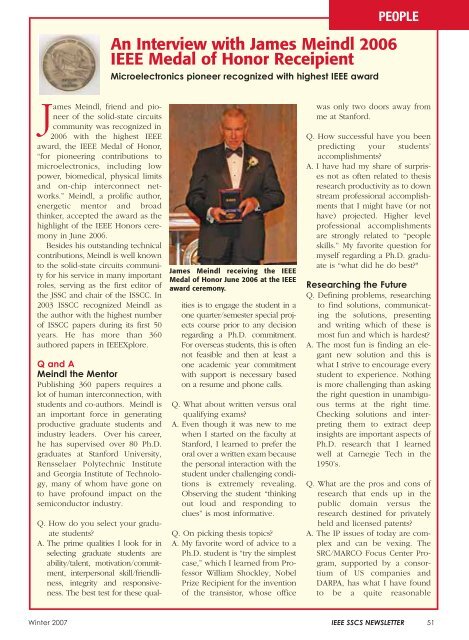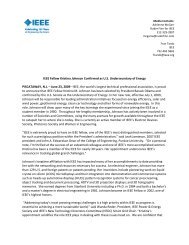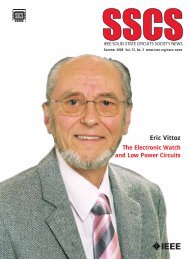The Impact of Dennard's Scaling Theory - IEEE
The Impact of Dennard's Scaling Theory - IEEE
The Impact of Dennard's Scaling Theory - IEEE
- TAGS
- scaling
- www.ieee.org
Create successful ePaper yourself
Turn your PDF publications into a flip-book with our unique Google optimized e-Paper software.
James Meindl, friend and pioneer<br />
<strong>of</strong> the solid-state circuits<br />
community was recognized in<br />
2006 with the highest <strong>IEEE</strong><br />
award, the <strong>IEEE</strong> Medal <strong>of</strong> Honor,<br />
“for pioneering contributions to<br />
microelectronics, including low<br />
power, biomedical, physical limits<br />
and on-chip interconnect networks.”<br />
Meindl, a prolific author,<br />
energetic mentor and broad<br />
thinker, accepted the award as the<br />
highlight <strong>of</strong> the <strong>IEEE</strong> Honors ceremony<br />
in June 2006.<br />
Besides his outstanding technical<br />
contributions, Meindl is well known<br />
to the solid-state circuits community<br />
for his service in many important<br />
roles, serving as the first editor <strong>of</strong><br />
the JSSC and chair <strong>of</strong> the ISSCC. In<br />
2003 ISSCC recognized Meindl as<br />
the author with the highest number<br />
<strong>of</strong> ISSCC papers during its first 50<br />
years. He has more than 360<br />
authored papers in <strong>IEEE</strong>Xplore.<br />
Q and A<br />
Meindl the Mentor<br />
Publishing 360 papers requires a<br />
lot <strong>of</strong> human interconnection, with<br />
students and co-authors. Meindl is<br />
an important force in generating<br />
productive graduate students and<br />
industry leaders. Over his career,<br />
he has supervised over 80 Ph.D.<br />
graduates at Stanford University,<br />
Rensselaer Polytechnic Institute<br />
and Georgia Institute <strong>of</strong> Technology,<br />
many <strong>of</strong> whom have gone on<br />
to have pr<strong>of</strong>ound impact on the<br />
semiconductor industry.<br />
Q. How do you select your graduate<br />
students?<br />
A. <strong>The</strong> prime qualities I look for in<br />
selecting graduate students are<br />
ability/talent, motivation/commitment,<br />
interpersonal skill/friendliness,<br />
integrity and responsiveness.<br />
<strong>The</strong> best test for these qual-<br />
An Interview with James Meindl 2006<br />
<strong>IEEE</strong> Medal <strong>of</strong> Honor Receipient<br />
Microelectronics pioneer recognized with highest <strong>IEEE</strong> award<br />
James Meindl receiving the <strong>IEEE</strong><br />
Medal <strong>of</strong> Honor June 2006 at the <strong>IEEE</strong><br />
award ceremony.<br />
ities is to engage the student in a<br />
one quarter/semester special projects<br />
course prior to any decision<br />
regarding a Ph.D. commitment.<br />
For overseas students, this is <strong>of</strong>ten<br />
not feasible and then at least a<br />
one academic year commitment<br />
with support is necessary based<br />
on a resume and phone calls.<br />
Q. What about written versus oral<br />
qualifying exams?<br />
A. Even though it was new to me<br />
when I started on the faculty at<br />
Stanford, I learned to prefer the<br />
oral over a written exam because<br />
the personal interaction with the<br />
student under challenging conditions<br />
is extremely revealing.<br />
Observing the student “thinking<br />
out loud and responding to<br />
clues” is most informative.<br />
Q. On picking thesis topics?<br />
A. My favorite word <strong>of</strong> advice to a<br />
Ph.D. student is “try the simplest<br />
case,” which I learned from Pr<strong>of</strong>essor<br />
William Shockley, Nobel<br />
Prize Recipient for the invention<br />
<strong>of</strong> the transistor, whose <strong>of</strong>fice<br />
PEOPLE<br />
was only two doors away from<br />
me at Stanford.<br />
Q. How successful have you been<br />
predicting your students’<br />
accomplishments?<br />
A. I have had my share <strong>of</strong> surprises<br />
not as <strong>of</strong>ten related to thesis<br />
research productivity as to down<br />
stream pr<strong>of</strong>essional accomplishments<br />
that I might have (or not<br />
have) projected. Higher level<br />
pr<strong>of</strong>essional accomplishments<br />
are strongly related to “people<br />
skills.” My favorite question for<br />
myself regarding a Ph.D. graduate<br />
is “what did he do best?"<br />
Researching the Future<br />
Q. Defining problems, researching<br />
to find solutions, communicating<br />
the solutions, presenting<br />
and writing which <strong>of</strong> these is<br />
most fun and which is hardest?<br />
A. <strong>The</strong> most fun is finding an elegant<br />
new solution and this is<br />
what I strive to encourage every<br />
student to experience. Nothing<br />
is more challenging than asking<br />
the right question in unambiguous<br />
terms at the right time.<br />
Checking solutions and interpreting<br />
them to extract deep<br />
insights are important aspects <strong>of</strong><br />
Ph.D. research that I learned<br />
well at Carnegie Tech in the<br />
1950’s.<br />
Q. What are the pros and cons <strong>of</strong><br />
research that ends up in the<br />
public domain versus the<br />
research destined for privately<br />
held and licensed patents?<br />
A. <strong>The</strong> IP issues <strong>of</strong> today are complex<br />
and can be vexing. <strong>The</strong><br />
SRC/MARCO Focus Center Program,<br />
supported by a consortium<br />
<strong>of</strong> US companies and<br />
DARPA, has what I have found<br />
to be a quite reasonable<br />
Winter 2007 <strong>IEEE</strong> SSCS NEWSLETTER 51




